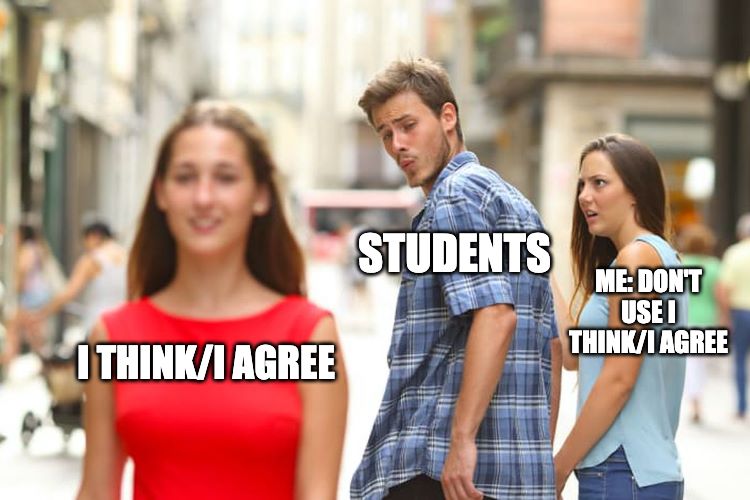“Any questions?” The teacher asks. An awkward silence there is.
The teacher turns this question into an activity, so that he knows what students don’t know. Only few of them take part. Even a “raise your hand” poll doesn’t get much response. Some of them are fiddling with their cell phones.
Two days before the term paper deadline, the teacher receives a few emails from those students asking for help. What they ask are what they have missed when they don’t respond or ask questions in the class.
After the assessment, 60% of the students have made the mistake that the teacher tells them not to throughout the semester, like this one:

Sounds familiar?
Teaching non-language majors, I often find it difficult to get them to listen to your lecture. Perhaps that’s because it is obscure as to how “literacy” is related to their disciplines. I would first blame myself for not experienced enough to make sure everything is clear to students — it is understandable that academic literacy is not a discipline that can be covered in 13 weeks.
That’s why I appreciate those who stop me at times in the middle of the class to ask for clarification, or those who stay after the class to clear things up before leaving, or those who schedule a consultation with me when they are free.
And actually, whether you do have questions or not, it is essential that you ask teachers questions:
You appreciate the teacher’s effort.
This is the more sentimental side of the matter. This is to appeal rather than reason:
Most teachers spend hours preparing for the class, often after office hours (I deny having “office hours”, frankly). It is not just for the salary; it’s also for the love for teaching, the love for ensuring students to have something meaningful to take away after each lesson and the semester, and the love for figuring out how the subject knowledge is organised so that it is easier for students to digest.
Asking us questions is better than complaining at the end of the semester because “the teaching is not clear enough” or “it is too difficult”. Certainly, I’m not asking you not to complain if things really go to the opposite of what the syllabus has promised; what I’m trying to say is, point it out as soon as things don’t look right as the class progresses.
This is especially so in the online teaching mode, when monitoring everyone’s progress isn’t really possible. I would add an “exit slip”, a 3-question survey that asks how well students think they have achieved the intended outcomes. So far, those who would rate lower scores have reached me for help, but I definitely hope to hear more from different people.
You show that you care about the knowledge you learn.
What you have learnt are all yours. I don’t buy the idea that students are customers — they learn what they pay for, or they pay for their grades.
Nope. You cannot buy grades from me. You cannot beg or extort grades from me. You are graded based on how capable you are of demonstrating you understand the stuff in assessments.
You learn what you want to, and in many cases what you learn at school isn’t just the knowledge per se: the knowledge about literacy, thinking, time management, interpersonal relations, and the art of asking questions.
I like students who express doubts about what they have heard, ask for advice after having a general direction for their essays, throw out ideas before asking for mine. These actions show that they care, perhaps about their grades (the ends); but many of them would benefit immensely during the process of discussion through asking (the means).
Trust me: if you ask me questions, I’m more than willing to give you way more than what you have paid for.
You also help the teacher learn.
Teaching is also a learning process, through which teachers can reflect on themselves: what approaches work, what tools need be mastered, how to arrange contents to make learning easier, etc.
Also, teachers want to know how well students take in the knowledge taught in class. If you ask questions, we know whether you meet the bottlenecks and where they are. We then know which part requires more explanations, more examples and more time.
If we can learn better, it means we teach better to help you learn better in turn.
To me, if I am to succeed, let’s succeed together.
[…] the ones who refuse to ask questions and have missed important cues and tips to tackle their topics would lose marks […]
LikeLike
[…] the previous post, I talked mostly on behalf of myself as a teacher. Here I want to take the perspective of a […]
LikeLike